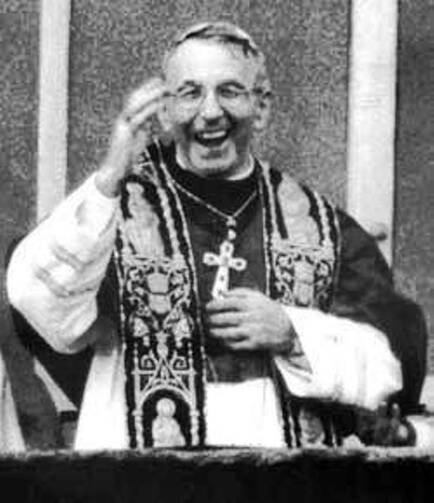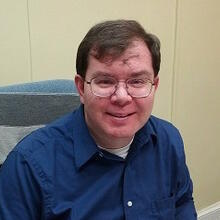Dear Don Albino,
People reading these jottings of mine may become scandalized: “Look at this,” they may say, “there he is writing another one of those ‘letters,’ first to a king, then a saint, and now a pope, and he doesn’t even know the proper form of address? Shocking! Just wait till those teaching nuns from St. Nicholas of Tolentine Elementary School in the Bronx get a hold of him! Then they’ll teach him the proper way of addressing the Vicar of Christ on Earth, the Successor of Peter, the Sovereign Pontiff, the Bishop of Rome, the Patriarch of the West!” Well, fortunately, I am many miles—not to mention many years away—to feel the whack of the ruler or to feel the pulsing throb behind the ear; but just the same, I feel comfortable writing to you like this; I don’t think I need to worry.
Besides, when you first appeared on the central loggia of St. Peter’s, your happy smile captivated everyone who saw you (even through television!) and through your kindly demeanor, you put a halo over Catholicism; you made religion a happy thing, not one of forbidding sternness. And yet, when you were elected on August 26, 1978, you yourself decided on an unprecedented double name, in honor of your two immediate predecessors, Paul VI and John XXIII (of whom you said: “I have not the culture of Pope Paul nor the heart of Pope John, but I am in their place.”) And in a gesture of humility (which was your espiscopal motto as a bishop) you chose to be known as the “Supreme Pastor,” and not as any of the other august titles that is traditionally given to the pope. And then people soon started calling you Papa Gianpaolo, a contraction of Pope John Paul the First, as that double moniker was quite a mouthful to say, at least in the beginning. However, in starting this letter, I thought it would be proper and appropriate to call you by your given name, because it sounds much friendlier and more human, and because you obviously came across that way to your new flock, the parish that was the whole world.
In that all-too-brief time when you were with us—33 days—you gave everyone a glimpse of what it means to be a joyful follower of Jesus; it was no small feat to do that in the media glare of klieg lights, TV monitors, and flashing cameras and radio and recording equipment strewn all around you. Yet, you were just yourself and acted that way and that is why people responded so willingly to what you had to say. Even you needed time to learn the ways of how to act as pope; when you first appeared before the world, your skullcap was slightly askew—it would not stay properly in place—prompting Basil Cardinal Hume (who took to calling you “God’s Candidate”) to say that “it was a winner” with people, because they could relate to someone new in his job. As learned as you were, you were gifted with the ability to make the lofty understandable; indeed, during one of your audiences a little girl way back in the crowd excitedly tugged at her father’s jacket, saying, “Daddy! I can understand what the pope says!” That was not something many people—learned or not, exalted or not—can do very easily, yet you spoke as one from one heart to another and made the Gospel something easily grasped at, even by a little girl.
You were truly a “people’s pope”; yet all popes are that—at least, they should be—but you exemplified it so well because you came from a poor background and you knew simplicity in all things. (After all, you described yourself this way: “I am a poor man, accustomed to small things and silence.”) Even though you knew poverty, you didn’t “feel” poor: you once related the story, that, as a boy, when you entered the church and heard the organ playing, you pretended that the overture was being played for the benefit of you and your playmates! You were rich in imagination, as well as faith and charity: there is also the story that in the difficult years after World War I, you had done some chore for a neighbor and that you were rewarded with a slice of white bread, an uncommon thing for people in those days. As it is related, you ran all the way home and gave it to your brother Eduardo as a present, eschewing it for yourself.
You were not poor in another way: through the gift of reading, books transported you to the world outside of your village where you were born (in Forno di Canale, in the Dolomite region of northern Italy in October 1912), and you became acquainted with all types of people, both fictional and real, from the saints and people of history to those who peopled the pages of literature, from everyone like Pinocchio to the characters from Mark Twain (purportedly one of your favorite authors). Because of this literary interest, you would eventually write Illustrissimi, a compilation of letters to the famous, real and fictional, with some moral lessons—and, as always, leavened with humor. It was through reading that you broadened your mind and exalted your spirit—it gave you the gifts of understanding and patience and empathy, qualities that shaped you as you journeyed through life as a priest, professor, catechist, bishop, cardinal patriarch of Venice and then, finally—as pope.
You communicated faith or should I say, radiated faith by your person and example. Yes, you were a priest and a teacher above all, long before you ever assumed episcopal dignity. Early on in your priesthood you were a catechist, teaching illiterate mountain people the elementals of the Christian faith (surely not an easy task), but because of those experiences, you wrote a book called Catechisi in bricole (“Cathechism Crumbs”), which, at the time of your election, was still being used as a teaching guide. In the month of your pontificate, you used your weekly audiences and Sunday Angelus addresses to teach about faith and life, illustrated with generous doses of good cheer. In one remarkable example, you said that we must treat our souls with great care, like cars: we must use the proper fuel in order to keep them in good working condition, lest we gum up the works with things we like, like jam and marmalade!
Shortly after your election, you had an audience with journalists who were in Rome to cover the funeral of Pope Paul and your subsequent election. In musing about journalism, you said that if Saint Paul was around today, he would be a correspondent for NBC. Perhaps, if you were to make that comment today, in this age of social media, you would amend that to say that if Saint Paul were here, he would likely be a blogger for America magazine! Probably, though, he would be a panelist on Sirius radio along with other America editors and proclaim the Gospel through that medium. But blogging, I think, would be more appropriate for him—being a writer—since I cannot see Saint Paul with a Twitter account, as he would be severely limited in what he could say: “Repent. Believe in the Gospel. A holy kiss to all believers. Paul.”
Yes, you were a teacher and a catechist, important things for a priest to be. But most of all, you were a man of faith and prayer, for that is what animated you and led you through your 65 years of life. (Even Pope Paul once said that seeing you in prayer would prompt people to pray along with you.) You once said that a theologian is one who not only speaks about God, but is someone who also speaks to God. In other words, faith is a dialogue, not a monologue—something we often forget. Faith was all encompassing for you; in one of your first utterances as pope, you said that God was our Mother as well as our Father, causing an uproar among those very learned theologians. You expressed surprise at their surprise: after all, you said, you were merely quoting Isaiah. But it was through your own mother that you learned about faith and trust; she taught you that prayer that you said all through your life and which you repeated shortly after becoming pope. You prayed as your mother, Bortola, taught you: “Lord, take me as I am, with my faults and with my sins, but make me become as You wish.”
The memories—very happy ones—of you remain from that idyllic summer of 1978. It is hard to believe that you were among us for just a month 36 years ago and the great grief and sadness that came when the news spread of your death “like a thief in the night” that took you shortly before you were to celebrate your 66th birthday. Being in high school myself during that time, I remembered looking forward to watching on television your first Christmas Mass at the Vatican (where, with your smile, you would have shone brighter than all the Christmas lights), only to be awoken by my mother the morning of September 29, 1978 to be told that you had died during the night. In sleepy disbelief, I ran up the hallway to the living room to see the news anchor Steve Bell on Good Morning America announcing the incredible news with your photograph on the TV screen. What Carlo Cardinal Confalonieri said during his homily at your funeral Mass rang true: you were like a meteor that flashed through the heavens and then you were gone.
That joyful month had ended with your untimely death and you became known by another name: “The September Pope.” Physically, you may have died, but your smiling example did not. It still lives in people’s hearts and you are soon to be beatified (and hopefully, canonized), to the gratitude of many. I suspect that you would be embarrassed by this talk of you being a saint; in your time as patriarch of Venice you were once host to Pope Paul and in his esteem for you, he took off his stole and placed it on your shoulders, causing you to blush. Could that have been a presentiment of what was to come? You could not have known that one day you would be pope, much less a saint. But we are grateful that God made you the one and that He will soon make you the other. After all, it is right and just, for as a servant of God in that September papacy, you showed us His smile.








